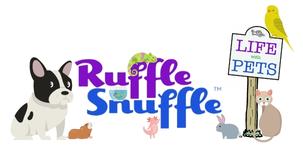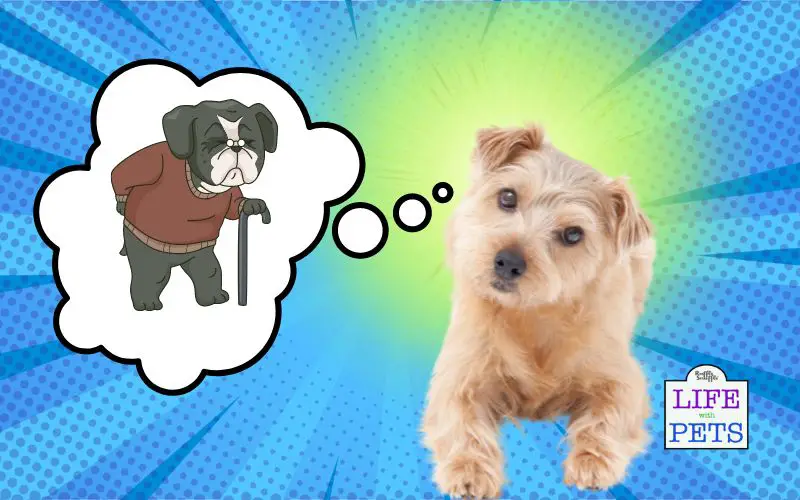So your dog has crossed the threshold into old age. It’s a wondrous time when your dog’s life, temperament and needs change completely. There’s so much information out there about the early years of a dog’s life, but very little on what to expect when your dog gets older. We’re here to change that! Here are the 5 things that will likely happen as your pooch enters their senior years.
1. Your dog’s mobility might change (or not)
Your dog will likely slow down when they get older.
Suggesting that your dog’s mobility may be affected or not during their twilight years is a non-committal statement. But let us explain.
Not all dogs age the same way. So although most dogs will have a slower pace when they hit senior life, it’s not the case for all dogs. Some will maintain their puppy-like zeal for running, jumping and skipping gleefully across the dog park. But in my experience, they will need a few minutes to catch their breath afterwards!
2. Your dog may suffer from doggy dementia
Yes, doggy dementia does exist! The scientific term is Canine Cognitive Dysfunction Syndrome or CCDS.
CCDS is a natural part of the ageing process for dogs but it doesn’t happen to all dogs.
Common symptoms include:
- Night walking
Senior dogs suffering from CCDS will pace at night. Often it’s paired with night howling as they get confused and anxious. - Increased anxiety
Speaking of anxiety, dogs with dementia have increased anxiety symptoms. It can result in peeing or pooping in the house. Obsessive licking is also an anxious/self-soothing behaviour. - Disorientation
Senior dogs can get extremely confused, even in familiar surroundings. They might forget walking routes or forget familiar faces. This depends on the severity of the CCDS. - Altered repeated behaviours
You can think of altered repeated behaviours as your dog acting out of character. Where they were once very clean, they may lose interest in self-grooming. They might eat less or prefer different food than the food you’ve always given them. Taste change, memory loss and higher irritability are the most common changes.
Although it can be distressing to see your pup go through these changes, they can still be lovely, joyful members of your household. Like human dementia, these episodes don’t happen all of the time. Your dog may suddenly get confused several times on one day, and only once on the next day.
The best thing you can do for your dog if you suspect they have CCDS is:
1. Get a formal diagnosis from a veterinarian.
2. Learn to manage their symptoms with compassionate care techniques. For example, soothing your dog when they are pacing and howling at night will help them quickly settle back to bed, rather than ignoring them.
3. Your dog will fart, burp and drool more
This is an interesting change that I did not expect when my dogs got older. But not an evening goes by when my dog doesn’t wake himself up by farting. It’s so pungent and loud, he’ll wake with a sudden shock as if he doesn’t understand where it came from.
From my research and listening to anecdotes from other dog owners, I’m not the only person who has noticed that my dog is far gassier in old age. Dog owners also report that their dog drools and dribbles more often too.
Not sure of the scientific reason for these changes, but it’s something you should expect to happen as your pup becomes a senior.
4. Your dog’s personality might change (for better or worse)
Personality changes are surprisingly common as your pup gets older. Sometimes temperament changes are linked to your dog’s physical condition.
For example, if your dog is losing their hearing or sight, they might become more anxious. They’ll rely on you more so they may be clingier too.
Some dogs become grumpy old farts. That means they could be snappier, less playful and more frustrated by too much attention.
They might become less tolerant of younger dogs, animals or children in your household and need a little more alone time.
Conversely, occasionally dogs become less aggressive and withdrawn as they age. In my case, my dog is a lot more sedate and warmer to strangers and other dogs in his old age as opposed to when he was younger.
When he was younger, he was much more likely to get into standoffs with rival dogs. He was never aggressive but he generally disliked the company of people or dogs he didn’t know.
Now he’s the flavour of the dog park! He loves cavorting with the dogs he encounters on his walks – young or old. He greets new humans with a chipper wag of his tail and bouncy energy.
It’s like he’s a completely new dog!
5. Your dog may lose their senses
Finally, your dog may lose their sense of sight, smell or hearing as they age. Their vocal cords can alter with a lower pitch or weaker growl than before too.
For sight, there is little that you can do. The most common early sign of sight loss is cataract disease. Sometimes vets will prescribe eye drops as medication but often blinding dogs can still live full and happy lives.
For smell, try playing nose games at home with snuffle mats or smell training kits. This will exercise that important sniffer and boost their smell sense.
For hearing, it depends on what is causing the hearing loss. Vets can use solutions to clear out ear wax. You should regularly clean your dog’s ears too. However, there is no cure if your dog is losing their hearing permanently.
If you notice that your dog is losing any of their sense, don’t panic. Consult your vet and learn to play with your dog in new ways to engage their other senses.
Final Thoughts: Expect the unexpected as your dog gets older
My parting advice would be to expect the unexpected! Your dog’s personality may change or it may not. Your dog may lose some of their senses or they may not! Learn as much as you can about what could happen and be prepared to love and support them no matter what happens.
.This article was originally published on www.rufflesnuffle.co.uk. If it is published on any other site then it is without the permission of the copyright owner.
Get the latest dog articles straight to your inbox
This is a guest post.

